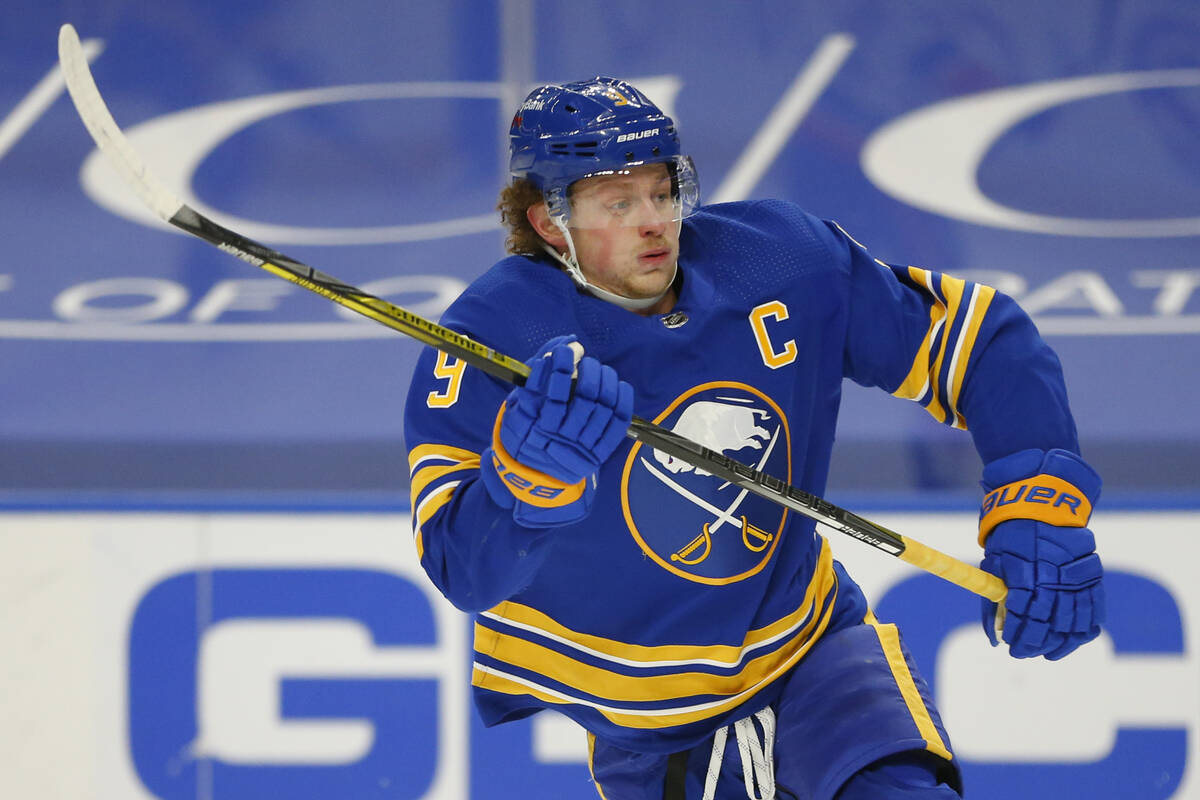Why Jack Eichel’s powerful skating helps make him an elite center
Most of the best skaters in the NHL share a common trait when it comes to the rhythm of their stride.
They motor across the ice with quick, explosive bursts, their legs churning like the beaters on an electric hand mixer.
Not Jack Eichel.
The newest member of the Golden Knights covers ground effortlessly, gliding with grace and elegance.
“But very, very powerful,” said Buffalo Sabres studio analyst Martin Biron. “He’ll give you a couple of strides and it will be like, ‘Wow, that just carried him.’ That’s the one thing that when Jack is at his elite level he gives you is that powerful stride and the skating.”
Eichel’s speed helps separate him from many of the league’s top centers.
The Knights, who acquired the three-time All-Star in a trade with the Sabres on Thursday, saw that firsthand when the teams played Jan. 14, 2020, in Buffalo.
During the third period of a 2-2 game, Eichel burst out of his own zone with the puck and needed a mere seven strides to reach the red line and create a two-on-one break.
He then blew past defenseman Shea Theodore, no slouch himself in the skating department, and flipped a forehand past the attempted poke check of goalie Marc-Andre Fleury for the winning goal.
“There’s only a handful of the guys in the world with game-breaking ability. When the game gets tight, that they can create something out of nothing,” coach Pete DeBoer said. “There’s only a handful of guys that have that type of skill, and he’s one of them. He’s on that shortlist.”
Competitive edge
Eichel’s skating and array of offensive skills made him the second pick in the 2015 draft behind Connor McDavid, and he was expected to energize a moribund franchise. The Sabres named him captain at age 21.
But in Eichel’s six seasons, Buffalo never had a winning season and he received a large share of the blame for the Sabres skidding sideways.
“I personally take accountability for the fact that we didn’t have success,” Eichel said. “I was the captain of the team, and a lot of that rides on me. As a group, over the years that I’ve been here, we obviously didn’t do enough to win and be successful and produce a team that the organization was happy with.”
The consistent losing ate at Eichel, who wears his competitiveness on his sleeve.
He requested a trade after the 2019-20 season, which negatively impacted his relationship with the organization behind closed doors.
Last season, Eichel didn’t appear to be himself before he missed the final 33 games with a herniated disk in his neck.
“In a losing situation, that competitiveness that is within you sometimes can comes across as a negative, right?” Biron said. “I think some of the most competitive players in the National Hockey League that have success have broken their sticks and slammed doors, and it’s looked at, ‘Wow, he cares so much.’
“But Jack, unfortunately in a tough situation in Buffalo for a few years, a lot of times it was like, ‘Oh, Jack’s mad again.’ Or, ‘Look at Jack, he’s upset.’ And maybe that’s unfair, because of the way the situation was.”
Eichel’s neck injury drove the final wedge between himself and the club. During his postseason exit interview, Eichel said there was a “disconnect” with his camp and the team about how he should be treated.
That led to a months-long standoff that ended with the trade and the Knights approving Eichel’s artificial disk replacement surgery Friday in Denver.
“It seemed like I’d been living in limbo for quite some time,” Eichel said. “I had what I think is a very productive summer preparing myself as much as I could and doing everything to make the transition post-operation as quick as possible to cut down the recovery time. I’m excited to get that behind me and get back to 100 percent health.”
Eichel’s recovery is estimated between three to five months, and he hopes to represent the U.S. at the Olympics in February if cleared.
Once he’s at full strength, Eichel, 25, immediately provides the Knights the type of franchise center that is a hallmark of Stanley Cup contenders.
And his connection to McDavid will continue to grow playing in the same division as the Edmonton Oilers’ star.
“There was a couple years not too long ago where I thought Jack was starting to close that gap,” NHL Network analyst Mike Rupp said. “I don’t think you get to be as great as these players without having those little things playing in the back of your mind. He’s going to be motivated in that aspect, too. He wants to show he can compete and play the game like Connor can.”
Scratching the surface
Eichel eventually will move into the No. 1 center role and allow the Knights to spread the scoring more evenly throughout the lineup.
Since 2017-18, Eichel has averaged 1.04 points per game — ahead of Mark Stone (1.02) — and has the ability to beat defenders one-on-one that was missing from the Knights in postseason losses to Dallas and Montreal.
“When he’s healthy and on his game, he’s up there with anyone,” said Knights goalie Robin Lehner, who played with Eichel for three seasons in Buffalo. “He’s pretty incredible.”
The biggest improvement in Eichel’s offensive arsenal is his shot, according to Biron, a former NHL goaltender.
Eichel scored 36 times in 68 games during the 2019-20 season that was cut short by the coronavirus pandemic. He is especially dangerous on the power play operating on his one-timer side from the left flank.
“He’s worked on it a lot, and over the years we started seeing Jack Eichel has an elite shot,” Biron said. “And actually, in my opinion, that’s where two years ago his game took a step forward because his shot was so good, so precise.”
With the Knights, Eichel also will be free from the burden of expectations he faced in Buffalo.
Despite being the Knights’ highest paid player with a $10 million salary cap hit, he can defer the leadership responsibilities to captain Mark Stone and other veterans and focus on helping the Knights win a Stanley Cup.
“I feel like I have a lot to bring,” Eichel said. “I feel like I’ve only scratched the surface of how good of a player I can be. There’s so many great players in the organization already and it’s such a competitive team. I think it’s only going to push me to be better.”
Contact David Schoen at dschoen@reviewjournal.com or 702-387-5203. Follow @DavidSchoenLVRJ on Twitter.
Jack Eichel file
Position: Center
Age: 25
Height/weight: 6-2/213
Birthplace: North Chelmsford, Mass.
Shoots: Right
Draft: First round (No. 2 overall) in 2015 by Buffalo
All-Star Games: 2018, 2019, 2020



































